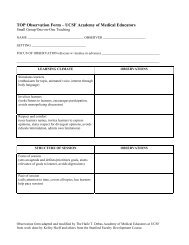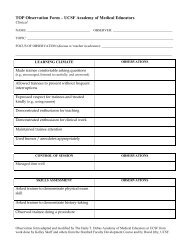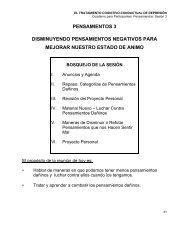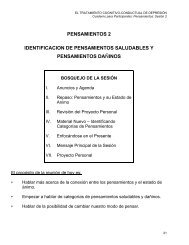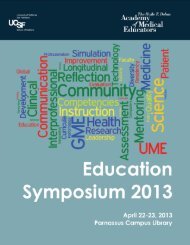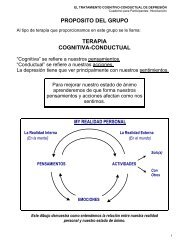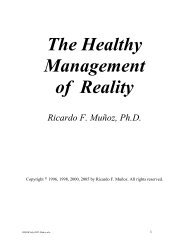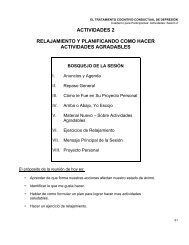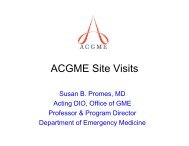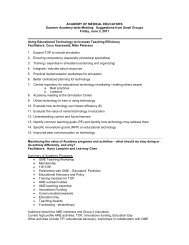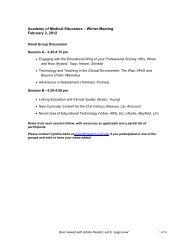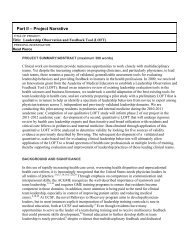2011 - UCSF School of Medicine - University of California, San ...
2011 - UCSF School of Medicine - University of California, San ...
2011 - UCSF School of Medicine - University of California, San ...
Create successful ePaper yourself
Turn your PDF publications into a flip-book with our unique Google optimized e-Paper software.
<strong>UCSF</strong> Education Day <strong>2011</strong>There were only rare differences in distributions <strong>of</strong>themes across gender, year in school, size <strong>of</strong> school, orschool nationality.Discussion: Healer’s Art medical students identify coreissues and values that they may repress or feel unableto sustain in medical training. According to the dataanalyzed here, medical training involves not onlypr<strong>of</strong>essional formation, but personal deformation as well.Medical educators must attend to both gains inpr<strong>of</strong>essional competence and the personal qualities andvalues that are at risk as students progress throughmedical training.Reflective critique: Judith Wrubel, PhD, anaccomplished qualitative researcher, helped design thestudy and analytic methods.References:1. Rabow MW, Remen RN, Parmelee DX, Inui TS. Pr<strong>of</strong>essionalformation: extending medicine's lineage <strong>of</strong> service into the nextcentury. Acad Med. 2010;85:310-17.Teaching and Assessing MedicalStudents’ Skills in Counseling forBehavior Change: A SystematicReviewKaren E. Hauer, MD, <strong>UCSF</strong>, karen.hauer@ucsf.edu;Patricia Carney, PhD, Oregon Health Sciences<strong>University</strong>, carneyp@ohsu.edu; Anna Chang, MD,<strong>UCSF</strong>, anna.chang2@med.va.gov; Jason Satterfield,PhD, <strong>UCSF</strong>, jsatter@medicine.ucsf.eduAreas abstract covers: UME, GMEDomain(s) addressed: Clinical Instruction andPerformance, Evaluation <strong>of</strong> Programs and Curricula,Patient CarePurpose: To characterize published curricularinterventions to teach medical trainees to counselpatients for behavior change and identify curricularformats that enhance patient outcomes.Background: Unhealthy lifestyle behaviors contribute toapproximately half <strong>of</strong> United States (US) deaths.However, physicians infrequently address importantbehavioral science topics during clinical visits and lacksufficient skill in counseling patients to implementbehavior change.Methods: We conducted a systematic literature search<strong>of</strong> studies published 1965-2010 evaluating curricula oncounseling for behavior change for medial trainees.Included studies described: (1) behavior changecounseling, (2) a teaching intervention for medicaltrainees, and (3) assessment <strong>of</strong> the intervention. Weextracted eligible articles and rated impact on learnersand patients using Kirkpatrick’s hierarchy.Results: Of 2,758 initial citations, 106 met inclusioncriteria. 75 studies described interventions for medicalstudents, and 88 for residents/fellows. Most studiesoccurred in the US (94) at single institutions (91). Themajority (77) occurred in primary care disciplines:internal medicine (36), family medicine (30) andpediatrics (13). The most prevalent study design waspre-post comparison; only 22 studies used a randomizedcontrolled design.The most commonly addressedcurricular topic for counseling for behavior change wassmoking (65 studies) followed by nutrition (27),alcohol/drug use (26), and exercise (20). Theoreticalframeworks uncommonly justified curricularinterventions, although 28 studies used thetranstheoretical model <strong>of</strong> change. 58 studies involved 8or fewer hours <strong>of</strong> curricular time, and 48 spanned 4 orfewer weeks. Outcome measures related to learnerattitudes, knowledge or skills were common; only 8studies showed benefit to patients or organizationalpractice.Discussion: Multi-institutional research on methods <strong>of</strong>teaching trainees counseling for behavior change thatinfluence patients’ health outcomes are urgently neededto ensure trainees’ clinical competence and improvedpatient care.Reflective critique: We will present our manuscript draftat ESCape 3/1/11 for feedback.The Educational Value <strong>of</strong> OvernightCall Amid Resident Duty HoursRestrictionsOren K. Fix, MD, MSc, <strong>UCSF</strong> Medical Center,oren.fix@ucsf.eduAreas abstract covers: GMEDomain(s) addressed: Competencies, Health Systems,Patient Care, Quality ImprovementPurpose: To compare faculty perception <strong>of</strong> theeducational value <strong>of</strong> a rotation with overnight call to onewithout overnight call.Background: The implementation <strong>of</strong> new ACGME dutyhours regulations in July <strong>2011</strong> will place new restrictionson post-graduate year (PGY)-1 trainees, primarily byrestricting consecutive duty hours to 16. Theseregulations limit PGY-1 residents from staying overnightfollowing a normal workday. Residency programs mustconsider the relative educational value <strong>of</strong> overnight callversus alternative duties that provide a similar learningexperience.<strong>University</strong> <strong>of</strong> <strong>California</strong>, <strong>San</strong> Francisco • <strong>School</strong> <strong>of</strong> <strong>Medicine</strong> 39



